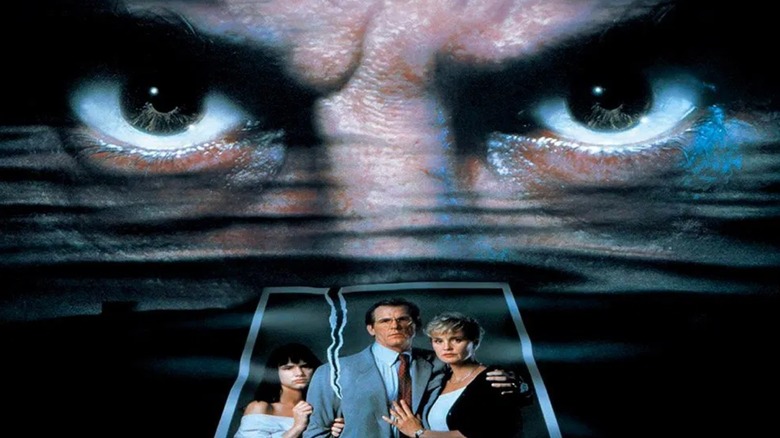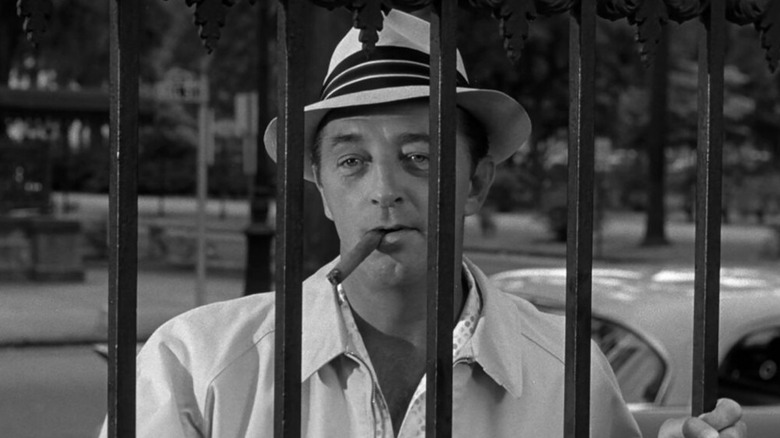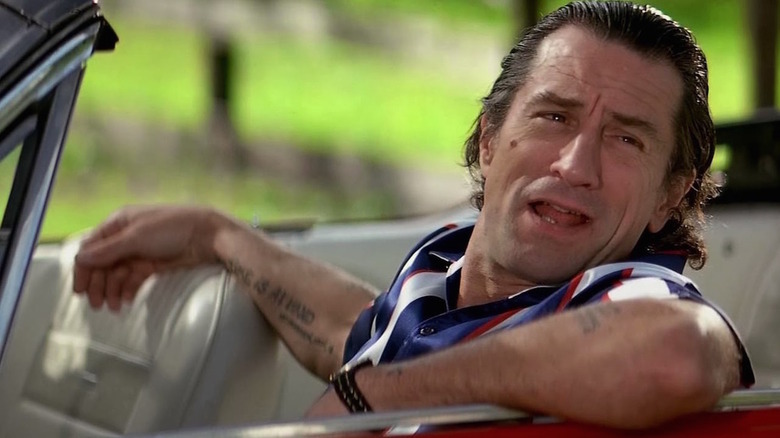Martin Scorsese's Cape Fear Was A Remake Of This Underrated Crime Thriller
We may receive a commission on purchases made from links.
When people hear "Cape Fear," they think of... well, probably the "Simpsons" episode "Cape Feare." Featuring Sideshow Bob stalking Bart Simpson, "Cape Feare" is the best ever movie parody the show has done.
But if it's not our favorite yellow family, the phrase "Cape Fear" is most likely to conjure Robert De Niro as Max Cady sitting in a movie theater, smoking a cigar and laughing his ass off. We at /Film consider "Cape Fear" one of the best movies Scorsese and De Niro have ever made together. It takes them away from their hometown of New York City, but Scorsese still uses his pet themes: violent men, a justice system that enables its own corruption, and good ol' Christianity. Hearing a smooth talking Southern twang coming out of De Niro's mouth may take a second of adjustment, but as Cady, he glues you to the screen like he always does.
"Cape Fear" is set down south and features Nick Nolte as Sam Bowden, a lawyer and family man whose very life and loved ones are endangered when a face from his past re-enters the picture. But it wasn't the first time this story had been told on film. Scorsese's "Cape Fear" is a remake of a 1962 thriller film titled — wait for it — "Cape Fear." Technically, both movies adapt "The Executioners" (the 1957 novel by John D. MacDonald), but that book has lapsed into obscurity in a way that neither film has.
Directed by J. Lee Thompson, the '62 "Cape Fear" stars Gregory Peck as Bowden and Old Hollywood's bad boy Robert Mitchum as Cady. If you think he's scary in "The Night of the Hunter" as murderous preacher Harry Powell, just watch Mitchum's Max Cady, who's got all the charm and menace of a hungry alligator.
Scorsese made "Cape Fear" with respect to the original. The film's stars even cameo in the remake: Mitchum plays a police detective, while Peck plays a shady, Bible-thumping lawyer retained by Cady. Thompson also approved of Scorsese and De Niro remaking the movie. Interviewed for "The Making of 'Cape Fear'" (a featurette on the 2001 DVD release of the 1962 film), the filmmaker described "The King of Comedy," which was directed by Scorsese and starred De Niro as fame-hungry wannabe comedian Rupert Pupkin, as his favorite movie. Naturally, he could trust no-one more to remake his movie.
In retelling "Cape Fear," did Scorsese, De Niro, and co. outdo the original?
Who had the better Cape Fear: Robert Mitchum or Robert De Niro?
The '62 "Cape Fear" was a film made in the vein of Alfred Hitchcock's "Psycho," down to shooting in black-and-white and getting Bernard Herrmann to compose the score. It's a comparison that holds up to this day because neither movie feels as scandalous now as they did upon their initial release. They're still great movies, to be clear, but what was boundary pushing then is restrained now. Even the black-and-white coloring of both films can feel less creepy and more austere.
Scorsese's "Cape Fear," though? That's a movie just as wild and frightening 34 years on, because it could be lurid where the original was held back by the Hays Code. It's a loud picture and not just because the movie reuses Herrmann's original booming orchestral music. Every shot, every cut, every swing of the camera is as huge as possible. Cady blasphemes that he's as big as God, specifically the Old Testament one who took everything away from faithful Job. With the way the film frames him and his tattooed torso, you almost believe it.
Sam is less of a good guy in the remake, complemented by the casting of the sweaty, haggard-voiced Nolte. In the original, he's as clean cut as Peck's jawline and practically the actor's audition to play Atticus Finch in "To Kill a Mockingbird." He keeps a happy home as his family's patriarch, while in the remake, he's on the cusp of cheating on his wife Leigh (Jessica Lange) with his clerk Lori (Illeana Douglas) — who Cady attacks and rapes, biting a chunk of her cheek out.
Bowden's history with Cady is also tweaked. Peck's Bowden saw Cady assaulting a woman, stopped it, and testified against Cady to put him away. The remake takes Bowden's job as a lawyer and connects it in a more compelling way; Nolte's Bowden was Cady's own defense attorney on a rape trial. He buried evidence that the victim was promiscuous because he could tell what a monster Cady was. Sometimes the moral choice is also the unethical one, but was it his right to condemn a man single-handedly like that? Cady himself would say that's reserved for God.
Cape Fear understood that what was transgressive in the '60s wasn't in the '90s
Bowden's daughter goes from the innocent little girl Nancy (Lori Martin) in the original to the moody teenager Danielle (Juliette Lewis) in the remake. Compare, too, how Cady tries to get at her. In the original, he ambushes her at school and there's a chase sequence. The string score is blaring to keep you on your toes, with Nancy looking for any possible escape as Cady slowly advances like a proto Michael Myers in "Halloween."
In the remake, Cady lures Danielle into her school auditorium (a fairy tale set on the stage suggesting that he's the Big Bad Wolf) and turns the charm up. He talks about her resentment towards her parents, and his sweet words have her eyelashes fluttering; Cady is able to walk up, kiss her, and stick his thumb in her mouth, all invited. That's not just more transgressive, it's also much scarier; Cady is acting less threatening, yet the danger feels more real.
Both films have essentially the same swamp-set climax. The Bowdens flee to a houseboat, but Cady follows them and attacks. The original makes Sam an action hero; the confrontation ends with him holding Cady at gunpoint and giving a righteous speech about how he's sparing Cady so he can rot in prison. (The ultimate proof that Peck is the best Batman we never had.) The final shot of the 1962 "Cape Fear" is the Bowden family sitting together in a speedboat, shaken but united.
The remake moves the action directly onto the Bowdens' boat during a rainstorm. Sam is no match for Cady, but before the latter can deliver a killing blow, he's swept away by the river. He drowns, babbling that he's "bound for the promised land." The movie then closes with a slow zoom in on Danielle's traumatized face until all you see are her frightened eyes; she narrates over the shot, saying things were never the same for the Bowdens. Her final words read as optimistic ("If you hang onto the past, you die a little every day. And for myself, I know I'd rather live."), but based on Herrmann's chiller score and Lewis' shaken delivery, it feels like Danielle's lying to herself.
If anyone could defy the trend of remakes rarely matching the original, it was Martin Scorsese and Robert De Niro at their '90s peak.


